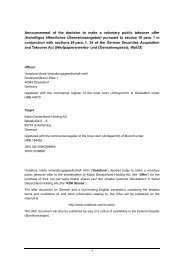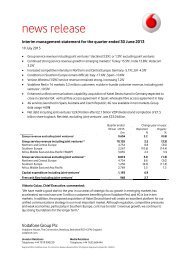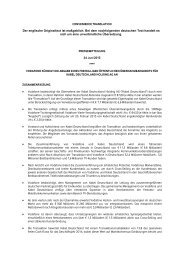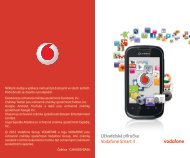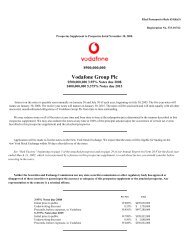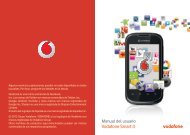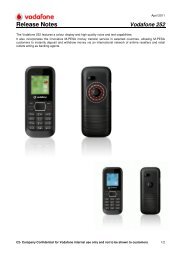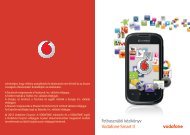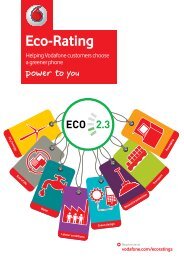Sustainability Report - Vodafone
Sustainability Report - Vodafone
Sustainability Report - Vodafone
Create successful ePaper yourself
Turn your PDF publications into a flip-book with our unique Google optimized e-Paper software.
Our strategy<br />
Our performance in 2010/11<br />
Eco-efficiency – doing more<br />
for customers<br />
with less<br />
Climate change, depleting natural resources<br />
and growing volumes of electronic waste are<br />
increasing pressure on global sustainability.<br />
Reducing our environmental impacts is clearly a sustainability priority for <strong>Vodafone</strong>,<br />
but this ‘eco-efficiency’ is also a business imperative.<br />
Stakeholders expect <strong>Vodafone</strong> to demonstrate leadership in tackling these issues;<br />
strengthening environmental regulations mandate robust action; and the rising costs<br />
of energy, resources and waste disposal have a direct impact on our financial returns.<br />
Fundamentally, we must do more for our customers with less: less energy, less carbon,<br />
less waste and fewer resources.<br />
Cutting the environmental impacts in our operations and our supply chain not<br />
only reduces our operating costs, but also helps us meet the increasingly robust<br />
environmental requirements of our business customers and investors. Cost savings<br />
also enable better returns for shareholders.<br />
Awareness of environmental issues is growing among consumers and this is becoming<br />
an important selection criteria in many purchasing decisions. As yet few people are<br />
prioritising ‘green’ products when they choose a mobile phone or service provider, but<br />
we expect this to change in the medium to long term. By making the environmental<br />
credentials of our products clearer, we can address this emerging trend and support<br />
consumers in making more environmental purchasing choices.<br />
We have greatest control over the impacts of our own operations and have extensive<br />
management systems in place to manage these. Key focus areas are reducing energy<br />
use and associated carbon emissions, resource use and waste – in particular, electronic<br />
waste from our network.<br />
However, we recognise that our influence extends beyond our operations and adopt a<br />
holistic approach to manage and reduce environmental impacts across our value chain:<br />
from design and manufacturing of products by suppliers through to use and disposal by<br />
our customers.<br />
We require suppliers to meet high environmental standards in their own operations<br />
and encourage strategic suppliers to declare their climate impacts through the Carbon<br />
Disclosure Project. We also work closely with our strategic suppliers to reduce our<br />
impacts by, for example, developing more energy efficient network equipment and<br />
‘greener’ products for our customers.<br />
Our new Environmental Principles encourage handset and accessory manufacturers<br />
to choose more sustainable materials, avoid hazardous substances and improve<br />
manufacturing efficiency. Many of our local markets also offer bespoke ‘green’ products<br />
and accessories for sale in-store, and encourage customers to recycle their mobile phones.<br />
Read more at vodafone.com/sustainability<br />
Tackling electronic<br />
waste<br />
<strong>Vodafone</strong> has a strong record of<br />
recycling electronic waste (e-waste)<br />
from our networks in countries<br />
where we have been operating for<br />
several years. Our local markets also<br />
have programmes in place to collect<br />
unwanted mobile phones for reuse and<br />
recycling, although consumer e-waste<br />
is not within our direct control.<br />
In mature markets, we often have a<br />
choice of expert recycling contractors<br />
and can rely on them to comply with<br />
international e-waste regulations.<br />
However, managing e-waste is more<br />
challenging in emerging markets<br />
where recycling facilities are often<br />
limited. Indeed, informal repair<br />
and recycling businesses in these<br />
markets consider e-waste a resource<br />
rather than an environmental issue,<br />
generating income by recovering<br />
valuable materials from old electronic<br />
equipment. But poor recycling<br />
practices using basic facilities can<br />
create risks to the environment and<br />
human health.<br />
We are committed to increase capacity<br />
for responsible recycling and disposal<br />
of e-waste in emerging markets. As<br />
a first step, we have commissioned<br />
research to understand how e-waste<br />
is currently managed to assess how<br />
this can be improved. Due to the<br />
global scale and complexity of the<br />
e-waste challenge, collaboration will<br />
be essential to make an effective<br />
contribution and we are engaging with<br />
others in our industry and beyond to<br />
share best practice.<br />
<strong>Vodafone</strong> Group Plc <strong>Sustainability</strong> <strong>Report</strong> for the year ended 31 March 2011 6



